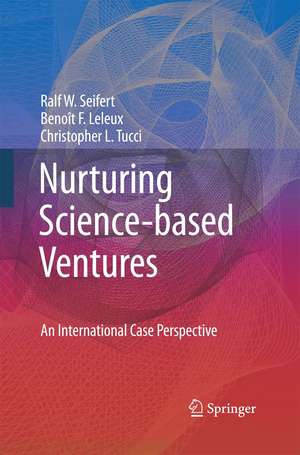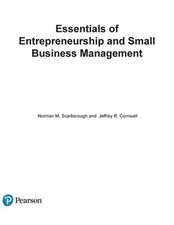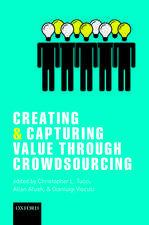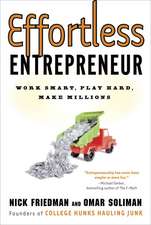Nurturing Science-based Ventures: An International Case Perspective
Autor Ralf W. Seifert, Benoît F. Leleux, Christopher L. Tuccien Limba Engleză Paperback – 4 noi 2014
| Toate formatele și edițiile | Preț | Express |
|---|---|---|
| Paperback (1) | 418.76 lei 6-8 săpt. | |
| SPRINGER LONDON – 4 noi 2014 | 418.76 lei 6-8 săpt. | |
| Hardback (1) | 424.54 lei 6-8 săpt. | |
| SPRINGER LONDON – 29 ian 2008 | 424.54 lei 6-8 săpt. |
Preț: 418.76 lei
Nou
Puncte Express: 628
Preț estimativ în valută:
80.13€ • 83.89$ • 66.30£
80.13€ • 83.89$ • 66.30£
Carte tipărită la comandă
Livrare economică 05-19 aprilie
Preluare comenzi: 021 569.72.76
Specificații
ISBN-13: 9781447158233
ISBN-10: 1447158237
Pagini: 828
Ilustrații: XXXIX, 787 p.
Dimensiuni: 155 x 235 x 43 mm
Greutate: 1.14 kg
Ediția:2008
Editura: SPRINGER LONDON
Colecția Springer
Locul publicării:London, United Kingdom
ISBN-10: 1447158237
Pagini: 828
Ilustrații: XXXIX, 787 p.
Dimensiuni: 155 x 235 x 43 mm
Greutate: 1.14 kg
Ediția:2008
Editura: SPRINGER LONDON
Colecția Springer
Locul publicării:London, United Kingdom
Public țintă
ResearchCuprins
Opportunity Recognition.- Planning the New Venture.- Venture Financing.- Growing the Entrepreneurial Firm: Building Lasting Success.- Harvesting.- Corporate Entrepreneurship.
Recenzii
From the reviews:
“The challenge is to nurture entrepreneurial skills and ambitions in science and engineering academic students in the hope that they will consider the starting of a new business based on their research as a compelling alternative to more traditional employment opportunities. The book by Seifert, Leleux and Tucci addresses this challenge. … designed as a teaching support for courses on science-based entrepreneurship and it primarily targets engineering and science students. … designed to help students explore the most relevant issues in science-based start-ups.” (Luca Iandoli, International Small Business Journal, Vol. 27 (5), November, 2009)
“The book focuses on science based ventures that originate in technological break throughs, but entrepreneurs from all backgrounds can learn from it. Nurturing Science-Based Ventures charts the development of a new venture through five chapters … . provides a useful text to accompany teaching. … accessible reference work for managers in knowledge-based industries, entrepreneurs from all business sectors, and stakeholders in business incubation processes. … It would add value to postgraduate reading lists … .” (Simon Stephens, The International Journal of Entrepreneurship and Innovation, Vol. 11 (3), 2010)
“The challenge is to nurture entrepreneurial skills and ambitions in science and engineering academic students in the hope that they will consider the starting of a new business based on their research as a compelling alternative to more traditional employment opportunities. The book by Seifert, Leleux and Tucci addresses this challenge. … designed as a teaching support for courses on science-based entrepreneurship and it primarily targets engineering and science students. … designed to help students explore the most relevant issues in science-based start-ups.” (Luca Iandoli, International Small Business Journal, Vol. 27 (5), November, 2009)
“The book focuses on science based ventures that originate in technological break throughs, but entrepreneurs from all backgrounds can learn from it. Nurturing Science-Based Ventures charts the development of a new venture through five chapters … . provides a useful text to accompany teaching. … accessible reference work for managers in knowledge-based industries, entrepreneurs from all business sectors, and stakeholders in business incubation processes. … It would add value to postgraduate reading lists … .” (Simon Stephens, The International Journal of Entrepreneurship and Innovation, Vol. 11 (3), 2010)
Notă biografică
Ralf W. Seifert holds a dual appointment as Professor of Operations Management at IMD and Professor of Technology & Operations Management at Ecole Polytechnique Fédérale de Lausanne (EPFL). Professor Seifert is also Director of the Mastering Technology Enterprise (MTE) program, a six-week management development program for technically trained managers. Since 1995, the MTE program has been jointly offered by the Alliance for Technology-based Enterprise formed by IMD, EPFL and ETH Zurich. His primary research and teaching interests relate to supply chain management, technology network management and entrepreneurship.
Benoît Leleux is the Stephan Schmidheiny Professor of Entrepreneurship and Finance at IMD. He is a specialist in venture financing, combining expertise in entrepreneurship, venture capital, private equity and growth management. His experience includes four years of corporate venturing in Southeast Asia for a major agribusiness conglomerate. He is active in a number of private equity funds, as well as numerous start-up companies in Europe and the US, as director, investor and/or advisor. He is also a co-founder of Venture Growth Strategies LLC, a Boston-based consulting company specializing in corporate venturing and early-stage private equity investments.
Christopher L. Tucci is Professor of Management of Technology at the Ecole Polytechnique Fédérale de Lausanne (EPFL). Professor Tucci joined EPFL in 2003. Prior to EPFL, he was on the faculty of New York University where he taught Technological Innovation & New Product Development, Foundations of Entrepreneurship, Business Policy & Strategy, and Competitive Advantage from Operations in the MBA program. He has also taught strategic management at MIT, and has taught a global strategy module for engineering managers in the Tufts University Gordon Institute.
Benoît Leleux is the Stephan Schmidheiny Professor of Entrepreneurship and Finance at IMD. He is a specialist in venture financing, combining expertise in entrepreneurship, venture capital, private equity and growth management. His experience includes four years of corporate venturing in Southeast Asia for a major agribusiness conglomerate. He is active in a number of private equity funds, as well as numerous start-up companies in Europe and the US, as director, investor and/or advisor. He is also a co-founder of Venture Growth Strategies LLC, a Boston-based consulting company specializing in corporate venturing and early-stage private equity investments.
Christopher L. Tucci is Professor of Management of Technology at the Ecole Polytechnique Fédérale de Lausanne (EPFL). Professor Tucci joined EPFL in 2003. Prior to EPFL, he was on the faculty of New York University where he taught Technological Innovation & New Product Development, Foundations of Entrepreneurship, Business Policy & Strategy, and Competitive Advantage from Operations in the MBA program. He has also taught strategic management at MIT, and has taught a global strategy module for engineering managers in the Tufts University Gordon Institute.
Textul de pe ultima copertă
The number of students who wish to learn about entrepreneurship and actively engage in entrepreneurial activities - either by creating their own companies or by spurring innovation within a large organization - has grown greatly in recent years. Motivating engineers and scientists to become entrepreneurial has particular appeal in light of the abundance of technological knowledge that lurks hidden in today's research institutes and technology-based enterprises, waiting for commercialization.
However the expanding number of teaching programs fail to address the particular challenges and opportunities for starting up viable businesses based on science and engineering.
Nurturing Science-based Ventures: An International Case Perspective presents case studies of more than 30 businesses in scientific fields such as biotechnology, biomedicine, high-tech engineering and information technology. The case studies are arranged in modules tracking the typical life cycle of creating and growing new ventures. The book is a value-adding teaching device that will greatly enhance the learning experience of future high-tech entrepreneurs. The case studies will also foster a general appreciation of technological venturing among current and future business leaders.
Module topics include recognizing and evaluating opportunities, creating viable business plans, securing financial resources, managing growth and eventually harvesting the value created. The view of large firms is also taken into account, with studies on corporate entrepreneurship and the integration of internal and external knowledge to successfully seize business opportunities. Each module of the book is completed by a topic primer and a concluding summary of key learning points.
Case studies include: Google, Logitech, adidas, Ducati, EndoArt, 4M Technologies, Novartis and Nespresso and many more university spin-offs and new start-up enterprises.
< ---
Praise for Nurturing Science-based Ventures: An International Case Perspective
While timing and luck are important factors for entrepreneurs, they are certainly no substitute for perseverance, hard work, and the ability to spot opportunities before others. Opportunity springs from many sources, not the least of which are breakthroughs in science and engineering. To close this gap is a critical issue, and that is why I am enthusiastic about this book, which I think will help entrepreneurs in their journey. In fact, this book will be a key resource for scientists and engineers looking to take research into development by creating exciting growth ventures.
Dietmar Hopp, Co-Founder SAP
---
Major R&D organizations in Europe and around the world increasingly adopt a venture mindset to manage internal and external technologies within a common innovation pipeline. Therefore, this is a timely and practical book. The work provides case studies of both market-based and corporate-venture initiatives, appropriately bridging the two sources of financing into a common theme. 'Nurturing Science-based Ventures' will surely provide an effective teaching guide to the subject of modern science and technology management.
Werner Bauer, Chief Technology Officer, Nestlé SA
---
While there is no blueprint for success, this book should be compulsory reading for entrepreneurs, ready to embark in the thrilling world of high-tech ventures! With its unique European focus, readers will learn through an impressive set of real world examples. If "the journey is the reward", this book will give readers a host of useful hints on how to "travel" best!
Daniel Borel, Founder and President of Logitech International
---
This bookwill be a practical resource -- and an inspiration -- to a new breed of global entrepreneurs interested in starting science- and engineering-based businesses. It takes an easy to follow step-by-step approach to starting a company and has a host of stimulating, well-researched international cases that illustrate the key concepts in a clear, succinct fashion.
Mary Tripsas, Harvard Business School
---
Moving science out of the labs and into the markets has always been one the tallest challenges; managers often disregard the basic science under the products or services, while scientists dismiss the contribution of the business people. Success requires the best of both worlds and the ability to work together over time. This book offers invaluable insights in the difficult Art of transforming science into successful businesses, building on the experiences of various European technology companies. Must read for anyone involved in or considering technology ventures.
Martin Velasco, Business Angel, Chairman & CEO, Speedlingua SA
---
There is a growing consensus in Europe that its future lies in knowledge, technology and innovation. That is why politicians call so much on scientists and engineers to be entrepreneurial and to transform the results of their research work into commercial success. This book is not only showing that Europe has its success stories and very inspiring ones, it gives above all a methodical view on how to go about setting up a successful science or technology-based venture. It is recommended reading for all those who want to contribute to overcoming Europe's (in)famous innovation paradox.
Janez Potocnik, Commissioner for Science & Research, European Commission
However the expanding number of teaching programs fail to address the particular challenges and opportunities for starting up viable businesses based on science and engineering.
Nurturing Science-based Ventures: An International Case Perspective presents case studies of more than 30 businesses in scientific fields such as biotechnology, biomedicine, high-tech engineering and information technology. The case studies are arranged in modules tracking the typical life cycle of creating and growing new ventures. The book is a value-adding teaching device that will greatly enhance the learning experience of future high-tech entrepreneurs. The case studies will also foster a general appreciation of technological venturing among current and future business leaders.
Module topics include recognizing and evaluating opportunities, creating viable business plans, securing financial resources, managing growth and eventually harvesting the value created. The view of large firms is also taken into account, with studies on corporate entrepreneurship and the integration of internal and external knowledge to successfully seize business opportunities. Each module of the book is completed by a topic primer and a concluding summary of key learning points.
Case studies include: Google, Logitech, adidas, Ducati, EndoArt, 4M Technologies, Novartis and Nespresso and many more university spin-offs and new start-up enterprises.
< ---
Praise for Nurturing Science-based Ventures: An International Case Perspective
While timing and luck are important factors for entrepreneurs, they are certainly no substitute for perseverance, hard work, and the ability to spot opportunities before others. Opportunity springs from many sources, not the least of which are breakthroughs in science and engineering. To close this gap is a critical issue, and that is why I am enthusiastic about this book, which I think will help entrepreneurs in their journey. In fact, this book will be a key resource for scientists and engineers looking to take research into development by creating exciting growth ventures.
Dietmar Hopp, Co-Founder SAP
---
Major R&D organizations in Europe and around the world increasingly adopt a venture mindset to manage internal and external technologies within a common innovation pipeline. Therefore, this is a timely and practical book. The work provides case studies of both market-based and corporate-venture initiatives, appropriately bridging the two sources of financing into a common theme. 'Nurturing Science-based Ventures' will surely provide an effective teaching guide to the subject of modern science and technology management.
Werner Bauer, Chief Technology Officer, Nestlé SA
---
While there is no blueprint for success, this book should be compulsory reading for entrepreneurs, ready to embark in the thrilling world of high-tech ventures! With its unique European focus, readers will learn through an impressive set of real world examples. If "the journey is the reward", this book will give readers a host of useful hints on how to "travel" best!
Daniel Borel, Founder and President of Logitech International
---
This bookwill be a practical resource -- and an inspiration -- to a new breed of global entrepreneurs interested in starting science- and engineering-based businesses. It takes an easy to follow step-by-step approach to starting a company and has a host of stimulating, well-researched international cases that illustrate the key concepts in a clear, succinct fashion.
Mary Tripsas, Harvard Business School
---
Moving science out of the labs and into the markets has always been one the tallest challenges; managers often disregard the basic science under the products or services, while scientists dismiss the contribution of the business people. Success requires the best of both worlds and the ability to work together over time. This book offers invaluable insights in the difficult Art of transforming science into successful businesses, building on the experiences of various European technology companies. Must read for anyone involved in or considering technology ventures.
Martin Velasco, Business Angel, Chairman & CEO, Speedlingua SA
---
There is a growing consensus in Europe that its future lies in knowledge, technology and innovation. That is why politicians call so much on scientists and engineers to be entrepreneurial and to transform the results of their research work into commercial success. This book is not only showing that Europe has its success stories and very inspiring ones, it gives above all a methodical view on how to go about setting up a successful science or technology-based venture. It is recommended reading for all those who want to contribute to overcoming Europe's (in)famous innovation paradox.
Janez Potocnik, Commissioner for Science & Research, European Commission
Caracteristici
Contains more than 30 field researched, real-world case studies, providing examples of both successful and less successful start-ups for a complete and authentic learning experience Includes classroom tested material, already used in IMD and EPFL teaching programs Easy to read and understand (for non-academics), the authors’ intimate knowledge of executive education means that the text is written in a language and style that managers appreciate Includes supplementary material: sn.pub/extras











